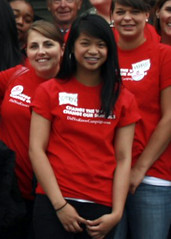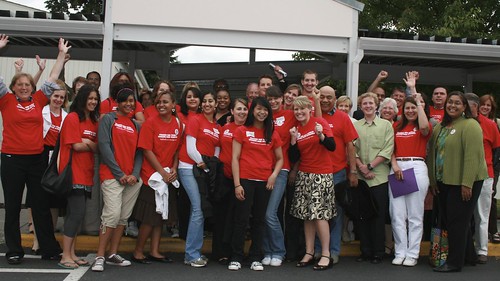This blog post is written by Connie Gerlitz, one of LEV’s key activists and longtime education reform leader and activist, in response to the Seattle School Board meeting on Wednesday.
We cannot confuse our love and respect for good teachers with the fact that their efforts are not universally replicated in our classrooms, and our children are suffering the consequences as evidenced by their inability to pass required standardized tests, graduate from high school, or take a college-level course.
Teachers and school communities need our help and support – collaboration time, clean and safe classrooms, continued monetary incentives, mentorships, remediation plans, praise and heart-felt thanks.
But students need so much more and one of those things (please notice that I said “one of those things”) is a motivated, caring, innovative, knowledgeable, and effective teacher in every one of their classrooms. We can’t fix ineffective parents. We can’t fix severe disabilities. We can’t fix poverty. We can, however, move toward providing them with teachers that prove that they have the ability to educate them. One of the ways (please note that I said “one of the ways”) is to measure student progress and use that progress as a means (please note that I said “a means”) of determining whether a teacher is effective or not.
I for one have really had it with the rhetoric that says that unless we are in a classroom we don’t understand what good teaching is. It is like saying that unless we are the chef in a restaurant we don’t understand what good food is or that unless we can wield the scalpel ourselves that we don’t know whether our appendix was removed successfully or not. Our food is nutritious and tasty. We no longer are the owners of an infected appendix. Our kids can read.
I have also have had it with the rhetoric that says that a teacher can not be held accountable for results if the student is hungry or doesn’t have a pencil or has a learning disability or is unruly. Get the kid some food – there are all kinds of agencies that will help. Get the kid a pencil – there are all kinds of agencies (PTA for one) that will help. Learn how to deal with the disability or find someone who will. Find out what it takes to get the unruly one under control or find someone who will. And, please don’t tell me that I don’t understand how impossible that is.
Here is a quick story: My mother taught school for 40 years and one of her first students was a blind child (also a neighbor). Blind children were not allowed at the time to be in normal public classrooms in the Franklin Pierce School District, but the parents really wanted him to be in my mom’s classroom. First she learned how to Braille. Then she went to the school board and petitioned to allow his entry into her class. When that was allowed, she brailled all of his needed reading material for 10 years. She opened the classroom doors in that district for blind children. He is, to this day, a highly respected and productive member of our community. That was not a part of her contract, by the way. I could go for days with the countless students our daughter has mentored in and out of foster homes, out of gangs, out of drugs, out of lethargy, out of anger management problems. Her kids move along and she would not have a problem with a test that proves it. She would welcome any help she could get if the test showed she was making no progress.
When I complained once to my mom about not liking to teach students who didn’t care about learning, she took me by the shoulders and said, “Honey, get out of teaching. They are the ones that need your help. The others will do it on their own.”
We need teachers that find a way to reach the ones that really need their help – the others will do it on their own. We don’t really need school at all for those bright, enthusiastic, healthy/wealthy, self-motivators – they will do it on their own.
And, I have had it with the rhetoric that says that a teacher’s effectiveness should not be judged on the actual educational progress of her students. What is it we don’t understand about a test that tells us what a child knows at the beginning of the year and what a child knows at the end of the year? Do teachers not give students tests to figure out if they learned a subject? Is there not a test that can tell us, in part, (please note that I said “in part””) if a teacher is successfully imparting the substance of a subject to his/her students?
I love and admire good teachers and I want to pay them and help them and honor them in every way possible and have spent almost 40 years working to improve the lot of teachers so they could properly educate our kids. The system is not working. Our kids are failing. We need change and we need it now but not the change that says that we will install an accountability system that has no teeth. Why, please tell me why, the union is not in favor of finding a way to reward effective teachers and get rid of the also-rans with a system that has some teeth – a test is just one tooth but it is one of the front ones and is noticeable and harmful when missing.
 Betsy Cohen testified in Olympia for the first time two weeks ago in favor of the college and career ready diploma (HB 2181). That might come as a surprise to those who know her, since Betsy has been involved in education advocacy for years—since moving to Washington state when her children were young.
Betsy Cohen testified in Olympia for the first time two weeks ago in favor of the college and career ready diploma (HB 2181). That might come as a surprise to those who know her, since Betsy has been involved in education advocacy for years—since moving to Washington state when her children were young. The National Assessment of Educational Progress (NAEP) 2013 test results were heralded recently by many in our state for the increases in fourth and eighth grade math and reading scores.
The National Assessment of Educational Progress (NAEP) 2013 test results were heralded recently by many in our state for the increases in fourth and eighth grade math and reading scores. I’ve never been part of history before. Don’t get me wrong, I’ve seen cool things and bad things, but saying I’ve witnessed History (capital H) would be a stretch. As I prepared for my trip I imagined what it would be like and, I have to say, I was wrong. My idea of History didn’t compare with what I experienced.
I’ve never been part of history before. Don’t get me wrong, I’ve seen cool things and bad things, but saying I’ve witnessed History (capital H) would be a stretch. As I prepared for my trip I imagined what it would be like and, I have to say, I was wrong. My idea of History didn’t compare with what I experienced. My trip built upon that moment. Every minute added another layer of power and depth. I spent the day walking the National Mall. Occasionally, I’d stop and talk to people, and they’d talk back. “Aren’t you excited?” “It’s really happening!” “This is my country.” Everyone was smiling. Everyone was helping one another whether by offering to snap a photo (I traveled alone), a piece of gum, a snack… anything. I slept only a few hours to board the metro just before 6 am and experience the start of a new day. The metro was PACKED, but no one pushed or argued or sniped. Instead people cheered, God Bless America broke out along with a short Happy Birthday to one girl who turned 21 (pictured at left).
My trip built upon that moment. Every minute added another layer of power and depth. I spent the day walking the National Mall. Occasionally, I’d stop and talk to people, and they’d talk back. “Aren’t you excited?” “It’s really happening!” “This is my country.” Everyone was smiling. Everyone was helping one another whether by offering to snap a photo (I traveled alone), a piece of gum, a snack… anything. I slept only a few hours to board the metro just before 6 am and experience the start of a new day. The metro was PACKED, but no one pushed or argued or sniped. Instead people cheered, God Bless America broke out along with a short Happy Birthday to one girl who turned 21 (pictured at left).
 I want all our children to go to schools worthy of their potential—schools that challenge them, inspire them, and instill in them a sense of wonder about the world around them. I want them to have the chance to go to college—even if their parents aren’t rich. And I want them to get good jobs: jobs that pay well and give them benefits like health care, jobs that let them spend time with their own kids and retire with dignity. – Barack Obama, ‘What I Want for You – and Every Child in America.’
I want all our children to go to schools worthy of their potential—schools that challenge them, inspire them, and instill in them a sense of wonder about the world around them. I want them to have the chance to go to college—even if their parents aren’t rich. And I want them to get good jobs: jobs that pay well and give them benefits like health care, jobs that let them spend time with their own kids and retire with dignity. – Barack Obama, ‘What I Want for You – and Every Child in America.’ Boarding a bus at seven in the morning to attend a State Board of Education meeting was not at the top of my summer to-do list. Honestly, I would have never guessed that attending a State Board of Education meeting would ever be on my calendar.
Boarding a bus at seven in the morning to attend a State Board of Education meeting was not at the top of my summer to-do list. Honestly, I would have never guessed that attending a State Board of Education meeting would ever be on my calendar.
